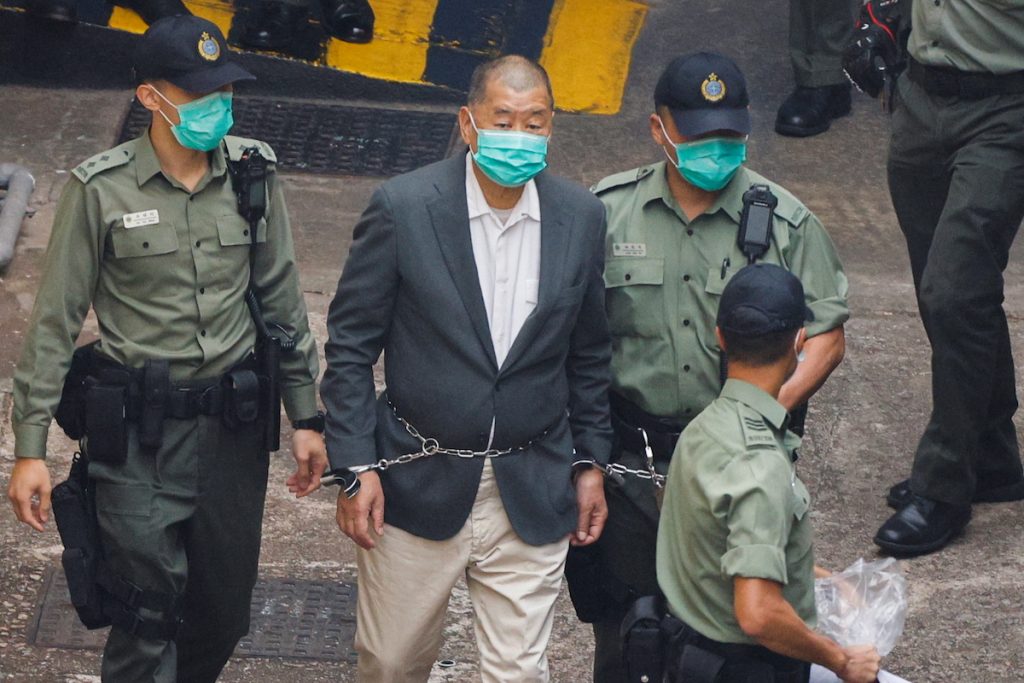Hong Kong’s High Court denied another bail application on Feb. 18 to newspaper publisher and Beijing critic Jimmy Lai, the most high-profile person to be charged under the Chinese-ruled city’s national security law.
The Court of Final Appeal ruled last week that a lower court’s decision last year to grant him bail applied “an erroneous line of reasoning,” but allowed Lai’s team to make a new application for bail to the High Court.
The High Court said it will publish its reasons for rejecting Feb. 18’s application at a later date.
Under the controversial new law, the onus is on the defendant to prove they would not be a national security threat if released on bail. Under Hong Kong’s common law-based legal system, the onus has traditionally been on the prosecution to prove its case.
Lai has been held in custody since Dec. 3, except for when he was released for about a week last year before his bail was appealed by the prosecutors and subsequently overturned. The 72-year-old Catholic was arrested in August when about 200 police officers raided the newsroom of his Apple Daily tabloid newspaper.
The tabloid and other media reported on Feb. 17 that Lai, while in jail, had been arrested again, on suspicion of assisting a fugitive that Chinese authorities captured at sea last year.
Beijing imposed the national security law on the former British colony last June after months of pro-democracy protests. The law punishes anything that the mainland Chinese government considers subversion, secession, terrorism or collusion with foreign forces with up to life in prison.

Critics say it is aimed at crushing dissent and it erodes freedoms in the semi-autonomous financial hub.
In an article about Lai’s case, barrister Senia Ng said that at the heart of the city’s legal system is the principle of rule of law, which is supposed to be protected by specific mention in Article 5 of the national security law (NSL).
“However, it appears that the principles of legal certainty and protection of fundamental rights which are central to the rule of law have been undermined by the NSL,” Ng wrote in the article published in Hong Kong Free Post. “Instead of bringing stability, the NSL has shaken up the legal system in Hong Kong, with its now proven ability to trump not only domestic legislation and the common law, but even human rights protections and Hong Kong’s basic law.”
Prosecutors have accused Lai of breaching the national security law over statements he made on July 30 and Aug. 18, in which they allege he requested foreign interference in Hong Kong’s affairs.
Lai has been a frequent visitor to Washington, meeting with officials, including former Secretary of State Mike Pompeo, to rally support for Hong Kong democracy, prompting Beijing to label him a “traitor”.
Lai stepped down last year as chairman of Next Digital, which publishes Apple Daily.
Lai was born to a rich family in mainland China in 1947. His family suffered once the communists took power in 1949, with his mother being sent to a labor camp. At the age of 12 he was smuggled into Hong Kong.
Cardinal Joseph Zen, bishop emeritus of Hong Kong, baptized him in 1997 the same year that the former British colony was returned to Chinese rule.
Democratic Party founder Martin Lee, a Catholic, is also among pro-democracy campaigners being held by the authorities. Along with Lai, the 82-year-old is being held on charges related to illegal assembly referring to mass pro-democracy protests that occurred in August 2019.
With Reuters






